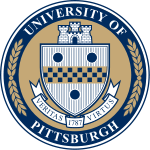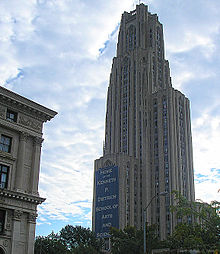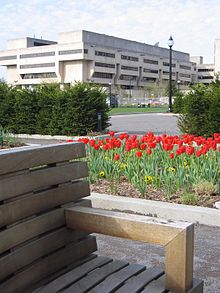- Dietrich School of Arts and Sciences
-
"Dietrich School" redirects here. For the college at Carnegie Mellon University, see Dietrich College of Humanities and Social Sciences.
Kenneth P. Dietrich School of Arts and Sciences 
Established 1787 Type Public Dean N. John Cooper Academic staff 1,012 Undergraduates 10,328 Postgraduates 1,511 Location Pittsburgh, Pennsylvania, USA Campus Oakland (Main) 
The Kenneth P. Dietrich School of Arts and Sciences (SAS) is one of the 17 schools and colleges of University of Pittsburgh located in Pittsburgh, PA. A direct descendent of the Pittsburgh Academy chartered in 1787, and the oldest part of the university,[1] the school serves as the liberal arts core of the university and provides instruction in natural sciences, humanities, and social sciences for all students studying at the Oakland campus, including more than 10,000 students registered as Arts and Sciences undergraduates. In addition, the Dietrich School of Arts and Sciences educates 15% (over 1,500) of the University’s graduate and graduate professional students, making it the largest graduate program in the Pittsburgh area.[2]
Contents
History
 The Cathedral of Learning at the University of Pittsburgh, the primary home of the Dietrich School of Arts and Sciences. In September 2011, a large banner was hung from the Cathedral's 16th to 5th floor announcing the name change for the school.[3]
The Cathedral of Learning at the University of Pittsburgh, the primary home of the Dietrich School of Arts and Sciences. In September 2011, a large banner was hung from the Cathedral's 16th to 5th floor announcing the name change for the school.[3]
Founded by Hugh Henry Brackenridge as the Pittsburgh Academy and chartered in 1787,[4] the Dietrich School of Arts and Sciences may have originally grew out of a school that was active before the charter was granted,[5][6] perhaps as early as 1770.[7][8] Thus the Dietrich SAS began its life as a preparatory school, presumably in a log cabin, in what is now downtown Pittsburgh, which was then on the frontier of the United States. The school was established on the principles of teaching the rudiments of the "sacred six" of the Scottish universities, as Brackenridge was himself Scottish.[9] Within a short period, more advanced education in the area was needed, so in 1819 the Commonwealth of Pennsylvania amended the school's 1787 charter to confer university status. The school took the name the Western University of Pennsylvania.[10]
By the 1830s, the school faced severe financial pressure to abandon its traditional liberal education in favor of the state legislature's desire for it to provide more vocational training. The decision to remain committed to liberal education nearly ended the university, but it persevered despite its abandonment by the city and state.[11] Similar pressure to abandon the liberal arts focus of the school occurred again between 1902 and 1908 when industrial development in the region was attracting more students to technical trades. Financial pressure mounted to abandon the traditional liberal arts curriculum and focus on more vocational training, but petitions from students, alumni, faculty and some trustees kept the original mission intact.[12]
Out of the school, which by then was often referred to as "the College", came the genesis for some of the university's other schools, such as the School of Engineering and School of Law. Both continued to require the traditional classical studies for a bachelor's degree, but they began to formally separate around the time when the university moved to its new location in the Oakland neighborhood of Pittsburgh, when it also changed its name to the University of Pittsburgh in 1908.[12] With the formal separation from the school of engineering, the school became known as the College of Liberal Arts and Sciences.
Several of the school's departments, like mathematics and chemistry, have an unbroken line of professors from the Pittsburgh Academy.[13] Courses such as astronomy, chemistry, English, mathematic, modern languages, and classics, are essentially descended from the academy and resemble the course listings of the day.[14]
In the summer of 2006, the School of Arts and Sciences began to oversee the administration of the University’s College of General Studies,[15][16] expanding the community of Arts and Sciences learners to include nontraditional students. On September 22, 2011, it was announced that an alumnus of the school's Department of Political Science, William S. Dietrich II, had donated $125 million to the university, the largest ever donation to the university up until that time, and that the university would rename the School of Arts & Sciences to honor his father, Kenneth.[17][18] The school's current dean is Norman John Cooper.
Academics
Entrance to Clapp Hall, part of the Clapp/Langley/Crawford Complex that houses the school's Deptartment of Biological Sciences and Department of Neuroscience
The Dietrich School of Arts and Sciences graduate programs offer MA, MS, MFA, and PhD programs in 34 concentrations, as well as a wide range of interdisciplinary programs.[19]
Undergraduate majors
- *also available as a minor
Undergraduate certificate programs
 The Nicholas Lochoff Cloister of the Frick Fine Arts Building, home to the school's Department of Studio Arts and Architectural Studies Program
The Nicholas Lochoff Cloister of the Frick Fine Arts Building, home to the school's Department of Studio Arts and Architectural Studies Program
Certificate programs allow students to complete a concentrated area of study in addition to their major. Certificates typically require 18-24 credits, are noted the student's transcript upon graduation.
- American Sign Language
- Children's Literature
- Conceptual Foundations of Medicine
- Geographic Information Systems
- German Language
- Historic Preservation
- Jewish Studies
- Leadership Certificate
- Medieval and Renaissance Studies
- Photonics
- Public & Professional Writing
- Women’s Studies
Certificates can also be obtained from the University Center for International Studies.
- African Studies
- Asian Studies
- European Union Studies
- Global Studies
- Latin American Studies
- Russian & East European Studies
- West European Studies
Graduate departments and programs
- Anthropology
- Bioethics
- Biological Sciences
- Chemistry
- Classics
- Communication
- Computational Biology
- Computer Engineering
- Computer Science
- East Asian Languages and Literatures
- Economics
- English
- French and Italian Languages and Literatures
- Geology and Planetary Science
- Germanic Languages and Literatures
- Hispanic Languages and Literatures
- Hispanic Linguistics
- History
- History of Art and Architecture
- History and Philosophy of Science
- Integrative Molecular Biology
- Intelligent Systems Program
- Linguistics
- Mathematics
- Molecular Biophysics
- Music
- Center for Neuroscience
- Philosophy
- Physics and Astronomy
- Political Science
- Psychology
- Religious Studies
- Slavic Languages and Literatures
- Sociology
- Statistics
- Theatre Arts
Graduate certificate-granting programs
- African Studies
- Asian Studies
- Composition, Literacy, and Pedagogy
- Cultural Studies
- European Studies
- Film Studies
- Latin American Studies
- Medieval and Renaissance Studies
- Russian and East European Studies
- TESOL
- Study of Women, Gender & Sexuality
Rankings
Many of the programs offered within the School of Arts and Sciences are considered among the best in the nation. For instance, the Department of Philosophy,[22] is considered one of the top five in the United States,[23] and the Department of History and Philosophy of Science,[24] consistently ranked at the top of the field.[25][26][27]
Other rankings, including those by the National Research Council and US News & World Report, include the following programs among the best in the nation:[28][29][30]
- Philosophy #2*
- Art History #22*
- Linguistics #23*
- Anthropology #25*
- Spanish #26*
- English #27*, #35^
- German #30*
- Religion #33*
- Statistics/Biostats #33*
- Psychology #36^, #48*
- History #37*, #42^
- Political science #31*, #39^
- Economics #34*
- Chemistry #34*, #43^
- Neuroscience #39*
- Economics #39^
- Physics #39*
- French #40*
- Music #40*
- Pharmacology #42*
- Molecular & General Genetics #46*
- Physiology #47*
- Computer Science #43*, #48^
- Physics #48^
- Sociology #54^, #59*
- Math #57*, #58^
- Biological sciences #58^
- Cell Biology #65*
- Geosciences #72*
- Biochemistry/Molecular Biology #87*
- Ecology/Evolution/Behavior #89*
*National Research Council[31]
^ US News & World Report America's Best Graduate Programs[31]References
Commons Room in the Cathedral of Learning
- ^ Starrett, Agnes Lynch (1937). Through one hundred and fifty years: the University of Pittsburgh. Pittsburgh, PA: University of Pittsburgh Press. p. 501. http://digital.library.pitt.edu/cgi-bin/t/text/pageviewer-idx?c=pittmiscpubs;cc=pittmiscpubs;q1=through%20one%20hundred;rgn=full%20text;idno=00afj8718m;didno=00afj8718m;node=00afj8718m%3A33;view=image;seq=0573.
- ^ School of Arts and Sciences - Message from the Dean, accessdate=2009-04-02
- ^ Harvith, John (2011-10-10). "Pitt Alumnus, Trustee, and Former Board Chair William S. Dietrich II, Who Gave the University the Single-Largest Gift in Its History, Dies". Pitt Chronicle (Pittsburgh, PA: University of Pittsburgh). http://www.chronicle.pitt.edu/?p=9555. Retrieved 2011-10-14.
- ^ The Story of Pitt
- ^ Starrett, Agnes Lynch (1937). Through One Hundred and Fifty Years: The University of Pittsburgh. Pittsburgh, PA: University of Pittsburgh Press. p. 26. http://digital.library.pitt.edu/cgi-bin/t/text/pageviewer-idx?c=pittmiscpubs;cc=pittmiscpubs;g=text-all;xc=1;xg=1;q1=1783;rgn=full%20text;idno=00afj8718m;didno=00afj8718m;view=image;seq=48;page=root;size=s;frm=frameset;. Retrieved 2009-12-21.
- ^ "Early Schools". Pittsburgh School Bulletin (Pittsburgh, PA: Pittsburgh Teachers Association, Inc.): 25. 1928-05. http://digital.library.pitt.edu/cgi-bin/t/text/pageviewer-idx?c=pitttext;cc=pitttext;g=text-all;xc=1;xg=1;q1=pittsburgh%20academy;rgn=full%20text;idno=22aep3676s;didno=22aep3676s;view=image;seq=0029. Retrieved 2009-12-22.
- ^ Holland, William Jacob (1893). First Alumni Year Book: Our University. Pittsburgh, PA: Alumni Association of the Western University of Pennsylvania. p. 36. http://digital.library.pitt.edu/cgi-bin/t/text/pageviewer-idx?c=pitttext;cc=pitttext;g=text-all;xc=1;xg=1;q1=pittsburgh%20academy;rgn=full%20text;idno=01ag83976s;didno=01ag83976s;view=image;seq=0038. Retrieved 2009-12-21.
- ^ Annual catalog of the Western University of Pennsylvania, Year Ending 1905. Western University of Pennsylvania. 1905. p. 27. http://digital.library.pitt.edu/cgi-bin/t/text/pageviewer-idx?c=pittcatalogs;cc=pittcatalogs;g=text-all;xc=1;xg=1;q1=1770;q2=academy;op2=near;op3=near;rgn=full%20text;amt2=40;amt3=40;idno=1905a754541;didno=1905a754541;view=image;seq=31;page=root;size=s;frm=frameset;. Retrieved 2009-12-21.
- ^ Starrett, Agnes Lynch (1937). "Masters and Students in the Academy". Through One Hundred and Fifty Years: The University of Pittsburgh. Pittsburgh, PA: University of Pittsburgh Press. pp. 27. http://digital.library.pitt.edu/cgi-bin/t/text/pageviewer-idx?c=pittmiscpubs;idno=00afj8718m;seq=49. Retrieved 2010-10-13.
- ^ "The Celebration of the One Hundred and Twenty-Fifth Anniversary: History of the University". University of Pittsburgh Bulletin 8 (21): 4–5. 1912-11-01. http://www.archive.org/stream/universityofpitt821univ#page/4/mode/2up. Retrieved 2010-01-20.
- ^ Alberts, Robert C. (1987). Pitt: The Story of the University of Pittsburgh 1787–1987. University of Pittsburgh Press. p. 17. ISBN 0-8229-1150-7. http://digital.library.pitt.edu/cgi-bin/t/text/pageviewer-idx?c=pittmiscpubs&idno=00c50130m&seq=37.
- ^ a b Starrett, Agnes Lynch (1937). "College of Liberal Arts and Sciences". Through One Hundred and Fifty Years: The University of Pittsburgh. Pittsburgh, PA: University of Pittsburgh Press. pp. 503–505. http://digital.library.pitt.edu/cgi-bin/t/text/pageviewer-idx?c=pittmiscpubs;idno=00afj8718m;seq=575. Retrieved 2010-10-13.
- ^ Starrett, Agnes Lynch (1937). "College of Liberal Arts and Sciences". Through One Hundred and Fifty Years: The University of Pittsburgh. Pittsburgh, PA: University of Pittsburgh Press. p. 517. http://digital.library.pitt.edu/cgi-bin/t/text/pageviewer-idx?c=pittmiscpubs;idno=00afj8718m;seq=589. Retrieved 2010-10-13.
- ^ Starrett, Agnes Lynch (1937). "College of Liberal Arts and Sciences". Through One Hundred and Fifty Years: The University of Pittsburgh. Pittsburgh, PA: University of Pittsburgh Press. p. 512. http://digital.library.pitt.edu/cgi-bin/t/text/pageviewer-idx?c=pittmiscpubs;idno=00afj8718m;seq=584. Retrieved 2010-10-13.
- ^ Highlights from CGS history, University Times, 2008-10-23, accessdate=2008-10-23
- ^ University of Pittsburgh Fact Book 2008, pg. 5
- ^ Begos, Kevin (2011-09-22). "University Of Pittsburgh Gets $125 Million Pledge". Huffington Post. http://www.huffingtonpost.com/2011/09/22/university-of-pittsburgh-_0_n_976739.html. Retrieved 2011-10-11.
- ^ Chute, Eleanor; Schackner, Bill (2011-09-23). "Pitt to receive $125 million gift". Pittsburgh Post-Gazette (Pittsburgh). http://www.post-gazette.com/pg/11266/1176865-298-0.stm. Retrieved 2011-10-11.
- ^ School of Arts and Sciences Graduate Studies, University of Pittsburgh, accessdate=2009-04-02
- ^ School of Arts and Sciences: Majors, Minors, and Certificates, University of Pittsburgh, accessdate=2009-04-02
- ^ Arts and Sciences Graduate Studies - Departments & Programs, University of Pittsburgh, accessdate=2009-04-02
- ^ Pitt Philosophy
- ^ The Philosophical Gourmet Report, date=Match 2009
- ^ Department of History and Philosophy of Science
- ^ "Internet Archive: The Philosophical Gourmet Report 2004-2006: Philosophy of the Sciences and Mathematics". 2008. Archived from the original on 2006-10-13. http://web.archive.org/web/20061013103433/http://www.philosophicalgourmet.com/breakdown.htm#13l. Retrieved 2008-03-26.
- ^ "The Philosophical Gourmet Report 2006-2008:Breakdown:Philosophy of Science". 2008. http://www.philosophicalgourmet.com/breakdown/breakdown14.asp. Retrieved 2008-03-26.
- ^ Graduate Programs in History and Philosophy of Science
- ^ Hart, Peter (2009-04-30). "U.S. News ranks graduate programs". University Times. http://mac10.umc.pitt.edu/u/FMPro?-db=ustory&-lay=a&-format=d.html&storyid=8679&-Find. Retrieved 2009=05-01.
- ^ Hart, Peter (2007-04-05). "U.S. News ranks graduate programs". University Times. http://mac10.umc.pitt.edu/u/FMPro?-db=ustory.fp5&-format=d.html&-lay=a&-sortfield=issueid%3a%3aissuedate&-sortorder=descend&keywords=US%20News&-max=50&-recid=39152&-find=. Retrieved 2009=05-01.
- ^ "Best Graduate Schools". U.S. News & World Report. 2009. http://grad-schools.usnews.rankingsandreviews.com/best-graduate-schools. Retrieved 2009-05-01.
- ^ a b "NRC Rankings in Each of 41 Areas". Research-Doctorate Programs in the United States: Continuity and Change. National Research Council. 1995. http://www.stat.tamu.edu/~jnewton/nrc_rankings/nrc41.html. Retrieved 2009-01-02.
External links
Categories:
Wikimedia Foundation. 2010.




